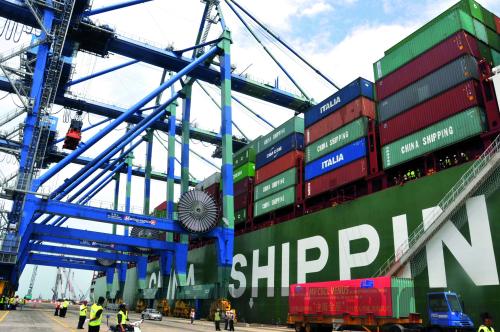| 
So, you're moving to China and can't pack your life into the 20kg suitcases allowed by airlines? You may want to consider shipping your personal belongings by air or by sea. Here is a guide to help you prepare for the big move and avoid any unhappy surprises when you arrive.
Procedures and paperwork
Be aware that shipping procedures are quite complex and require several different documents and countless official stamps. Moreover, if you intend to settle in an inland Chinese city, you may need to make several trips to the nearest port to clear customs. If you are lucky enough to have your moving expenses covered by your employer, a relocation agency will probably take care of everything for you. But if you're on your own, carefully choose a shipping agent in your country of origin, preferably one that has connections in China and will be able to guide you through the process.
Only foreigners holding one-year residency permits or residency cards are allowed to ship household goods and personal effects to China. Also note that foreigners are limited to importing one air and one sea shipment within six months of arrival. While it's not necessary for you to personally pick up your goods, customs regulations require that you arrive in China before your shipment so that all formalities can be handled.
Foreigners shipping possessions first need to get an import permit at a customs office. In order to get this permit, you will have to present your residence permit along with a work or study permit, a company or university letter certifying your employment or enrolment, the ocean bill of lading or airway bill, and a detailed inventory list in Chinese. Make sure to include all of your items on this list as shipments are subject to physical inspection by customs. Any items not declared on the inventory list may be confiscated or incur fines.
Once you get your import permit, you'll have to go to the port of arrival and clear your shipment through customs and quarantine. You'll need to present the import permit and your passport along with your residency permit, your work or student permit, a customs clearance and quarantine form, an inventory list that should exactly match the one included in the import permit, a fumigation certificate if you are importing a whole container, and an ocean bill of lading or airway bill.
What you can and cannot import
As a general guideline, clothing, books and kitchenware can be imported into China duty-free. In addition, each importer can import a maximum of 50kg of food and non-alcoholic beverages as personal effects.
Furniture, electronics, stereo equipment, office equipment, wine, liquor, alcoholic drinks, cigarettes and tobacco, motor vehicles and motorcycles are subject to import taxes and duties (note that the importation of motorcycles is prohibited unless the owner is a diplomat). In general, the import taxes and duties charged are approximately 10 to 30 percent of a good's value as determined by customs assessments.
Import taxes for alcohol are very high, and alcohol cannot be imported into certain Chinese cities, including Beijing. It is strongly recommended that you not import this item into China as it will either be confiscated, or you will be charged heavy penalties and fines.
A reasonable number of CDs and DVDs can usually be imported duty-free, although customs officers can impose duties on these items. These items will be examined and screened by customs, and any objectionable content may result in heavy fines and penalties, confiscation, prosecution and detention of the entire shipment.
Any oriental antiques and objects must be declared in detail, otherwise their re-export might be prohibited. Items that may not be imported include weapons, ammunition, replica guns, drugs and narcotics, counterfeit or pirated goods, morally offensive materials, animals on the endangered species list, meat products, plants and seeds, and photocopiers.
Importing a pet or a car
Only one pet cat or dog is allowed per household. Anything else will be classified as an exotic animal, and will be required to undergo different and more complex inspection procedures. Make sure to check your home country's regulations concerning exporting animals before your departure. You will probably need an official export certificate and a recent health certificate from a qualified veterinarian. Your pet should also have certification demonstrating that it is up-to-date on rabies vaccinations.
Upon arrival, pets will spend a quarantine period in a government-run facility. Animals arriving in Beijing must spend 30 days in quarantine period and those arriving in Shanghai must spend seven days in quarantine. If you use a relocation company, their agents may be able to reduce the quarantine to one night or to arrange for a home quarantine, especially for elderly pets.
As for importing a car for personal use, an import permit has to be approved by China customs prior to shipment. This permit is quite difficult to get, so do not ship your car before obtaining it. You'll have to pay full import duties (the amount will depend on the size and type of the vehicle), and you will need to provide documentation proving the vehicle's age and value. |